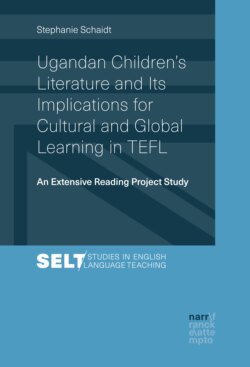Читать книгу Ugandan Children's Literature and Its Implications for Cultural and Global Learning in TEFL - Stephanie Schaidt - Страница 38
На сайте Литреса книга снята с продажи.
5.3 Qualitative Research Design
ОглавлениеA qualitative research design is adopted for this study. As Flick (2014, p. 22) points out, “[q]ualitative research is oriented towards analysing concrete cases in their temporal and local particularity and starting from people’s expressions and activities in their local contexts”. Qualitative studies are particularly productive when there is not yet much known about the object of research (exploratory study) and when researchers are interested in the personal background of individuals and the ways in which these construct meaning (ibid., pp 12–13). As Flick (ibid., p. 16) further states, “[q]ualitative research takes into account that viewpoints and practices in the field are different because of the different subjective perspectives and social backgrounds related to them”. A qualitative study, therefore, gives insights into subjective meanings and also demonstrates the variety of perspectives which exist.
The aim of the present research is not the confirmation or determination of ex-ante hypotheses, but instead the exploration of a rather unresearched field. My study looks into subjective perspectives of Year 9 students in Germany on Ugandan children’s fiction and analyses them against the personal background of the individuals.The focus of the research is, therefore, on the case and its specific features. In the second part of the analysis, I then establish some generalisable statements by comparing the various cases. Nevertheless, the research project does not claim to be representative; it focuses on the participants of my study. Therefore, opting for a qualitative research design was meaningful in this context.
